Marketing Analysis Software: 12 Tools to Simplify Your Life
“Analysis is the art of creation through destruction.” — P.S. Baber in Cassie Draws the Universe.
This is a quote that all content marketers should have taped up somewhere in their offices, where they can see it every day.
Because that’s exactly what marketing analysis is. It’s the process of looking at what you’ve done (and what your competitors have done) with a critical eye, tearing down and replacing what isn’t working and optimizing what is.
While content analysis tools typically target page-level details, marketing analysis tools are more holistic in nature.

What Is Marketing Analysis and How Can Software Help?
Marketing analysis is a two-step process. First, you analyze the content and social media marketing trends in your industry and what your audience is responding to. Included in that analysis is a detailed report on what your competitors are up to.
Once you’ve done that and deployed your own content strategy, you’ll begin the second step: going back to analyze the performance of your marketing efforts and make adjustments accordingly.
And some tools can help you do that. They can keep an eye on trending topics as well as competitors’ performance. They can automate redundant tasks like sending out emails, and they can help you engage customers at the right moments in the buyer’s journey.
Let’s take a look at some of the more helpful marketing analysis tools out there.
Marketing Analysis Software and Tools
Marketing analysis software, like most content marketing tools, are built for different aspects of your content marketing plan. Some analyze how your content is performing or how your competitors are faring, while others manage customer relationships or automate emails and post to social networks.
And then there are the tools that do more than one job or do it all.
I’ve listed some of the software marketing and sales professionals find useful and grouped them by the tasks they can perform. Just remember, some of these are large, enterprise-level tools that can perform more than one job. It’s worth it to take a close look, and even request a demo, to make sure it’s the right fit for your company.
Competitive Analysis
Before you begin a content marketing strategy of your own, take a look at what’s trending and what your competitors are doing. If, for instance, you’re an insurance company and your competitor’s website is ranking high on fire prevention but poorly on water leaks, there’s an opportunity to fill a gap.
By analyzing both the popularity of keywords about leaks and your competitors’ coverage, you can create a solid content plan around the topic and outrank your competitor.
Competitor analysis tools can help you do that initial research, and even help you write strong content that will rank. Here are a few.
MarketMuse
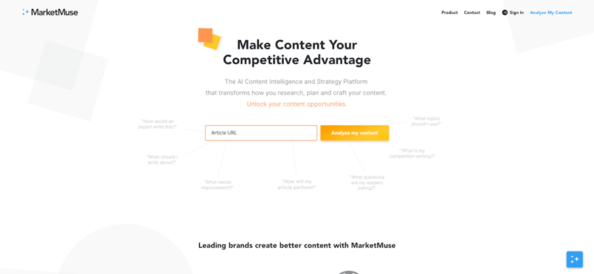
MarketMuse is a great platform for content marketing research, tracking, and optimization, but it can also help you do a very comprehensive competitive analysis.
Analyze your competitors’ content just like you would analyze your own to determine where their content gaps are, then create content for your site to fill those gaps. Discover where they have thin content, and then write something more in-depth, that will garner more domain authority.
Finally, look at the keywords they are ranking on to see where you can compete.
Kompyte
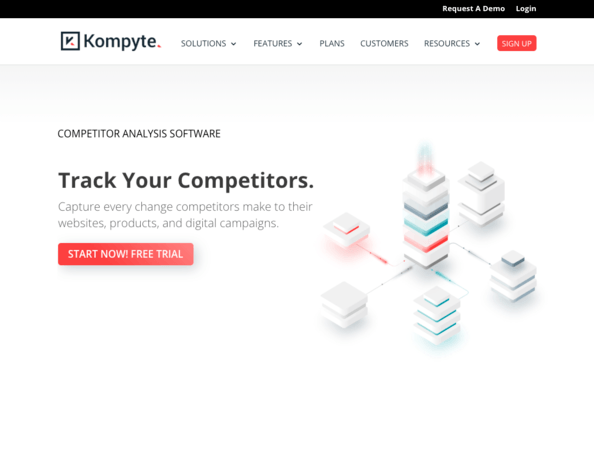
Kompyte is kind of like having a mole inside your competitors’ marketing teams. You can set it up to track multiple competitors and alert you when they publish something new, start a new campaign, or make any change to their content marketing strategy. You can also analyze the competition using their web analytics tools.
SimilarWeb

This is a pretty comprehensive competitor analysis platform. But one of the cool things SimilarWeb does is keep a very close eye on the competition. You can check all the usual SEO and ranking stats but can also discover the organic and paid keywords for which they rank, as well as the landing pages those keywords are driving traffic to. Finally, marketers can keep track of their display advertising and PPC efforts.
Digital Marketing Analytics
Once you’ve created and deployed your content plan, it’s time to start keeping track of how you’re doing. Of course, you can always use Google Analytics; the free software Google provides to measure metrics like pageviews, time on page, origins of visitors, and bounce rate.
But there are some more sophisticated tools out there that can help you drill down into your content and your campaigns as a whole.
Looker
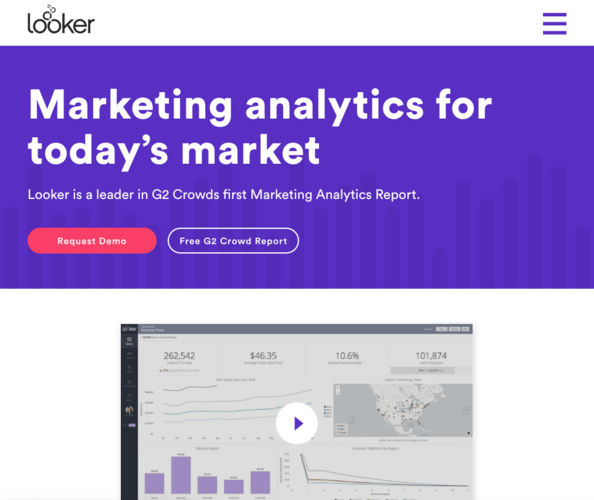
This is a Saas- and web-based platform that delivers all kinds of analytics for different aspects of your business. For the marketer, Looker allows you to centralize all of your marketing analytics in a customizable dashboard. You can track campaign and web analytics and track your customer acquisition.
IBM

Remember Watson, the computer that beat the Jeopardy champion? Now you can use the same AI technology to analyze and track your marketing campaigns. You can integrate all of your analytics and get information on areas that are costing you conversions.
IBM also uses predictive analytics to warn you when you’re at risk of losing a previously loyal customer.
Sprout Social
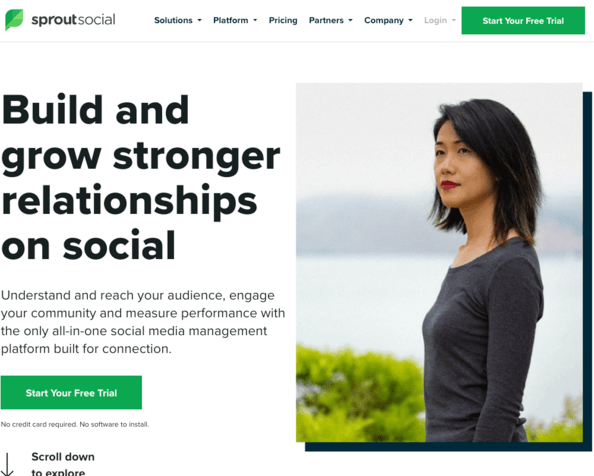
The name says it all. Sprout Social is all about social media analytics; helping you track and analyze all of your social media marketing. Not only can you use it to determine the success of your content across social media channels, you can identify trends through social listening and consolidate your engagement efforts into one inbox, as well.
CRM Software
CRM stands for customer relationship management. And believe it or not, some tools can help you make personal connections to retain the customers you acquire through your content marketing.
Salesforce
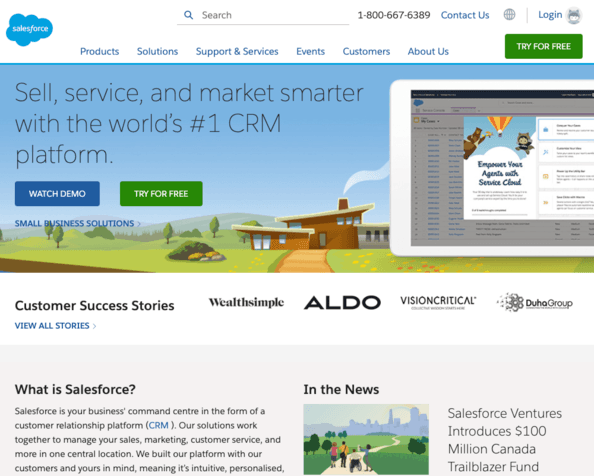
With a name like Salesforce, you would think that this is a CRM tool meant mainly for sales teams. But it is a potent tool for marketers, as well.
Marketers can use the information they collect to create complete customer profiles. And Salesforce has AI capabilities to help you react to customer interactions. You can also use their analytics for market segmentation; engaging with customers at several points in the buyer’s journey.
Insightly
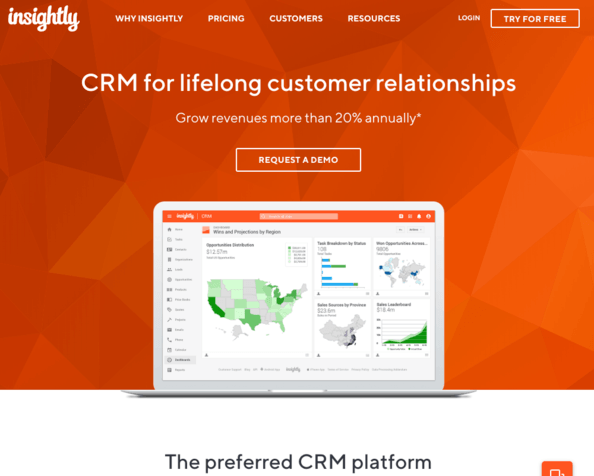
Sure, you can track the usual metrics on a customizable dashboard, but there are so many other neat things Insightly can do. The cool function is relationship mapping. Use this tool to map out who knows who within your network of customers to build stronger relationships.
You can also build custom apps for your customers without having to know a single line of code.
Zoho

Zoho also uses AI to help you identify anomalies or suggest the best times to contact a customer. The difference? This one talks to you. It’s called Zia, and it learns from every interaction you have with customers.
You can also pull all of your marketing channels into one dashboard, to interact with customers across multiple platforms at the same time.
Digital Marketing Automation
Once you get a good rhythm down with your content marketing strategy, it’s time to start offloading some of the more regular or mundane tasks so you can concentrate on analysis and iteration. Things like email and social post scheduling, tracking, and nurturing leads, and collecting customer data can all be handled by CRM software.
Marketo
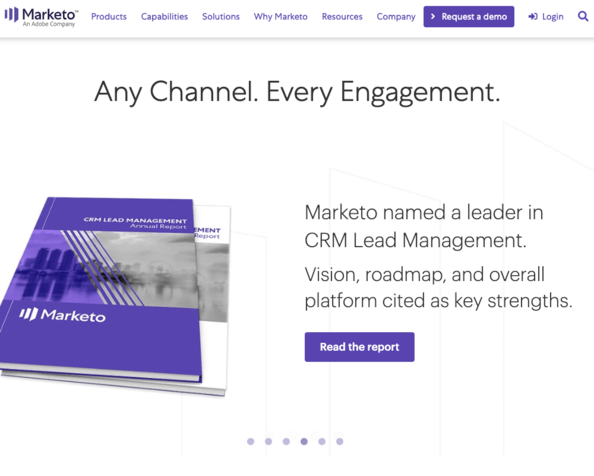
Marketo lets you customize your email marketing, nurturing, ad targeting, and mobile engagement. Then, you can launch and track it all without much effort on your part. You can also nurture leads at every part of the buyer’s journey with automated content.
Constant Contact
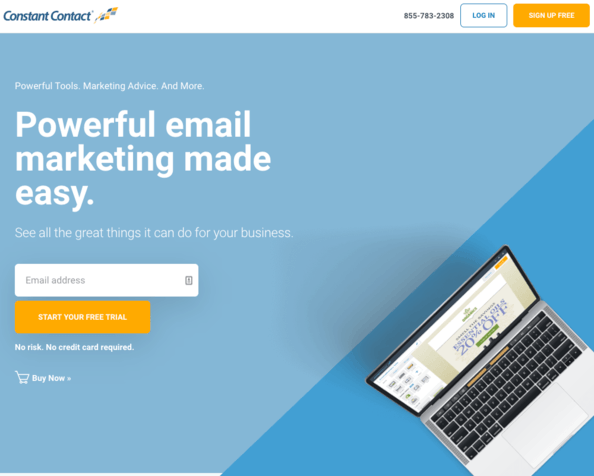
Constant Contact takes care of every aspect of your email marketing campaigns. You can customize your emails using their templates, schedule email pushes, collect email addresses from your site as well as your social media platforms, and then track it all to analyze open rates.
ActiveCampaign
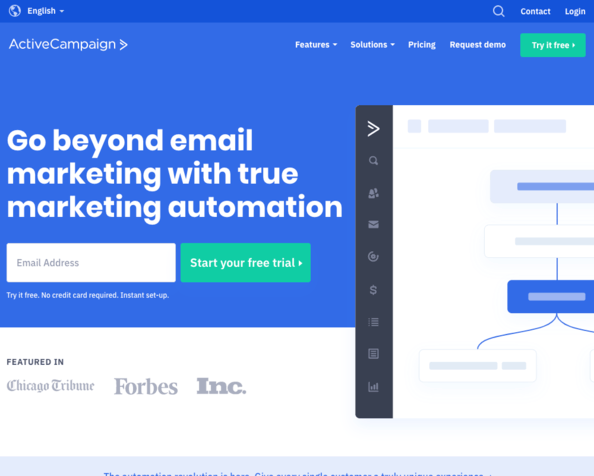
This tool actually combines email marketing automation and CRM. Not only can you hyper-customize responsive emails, but you can set those emails to send out when a certain customer behavior triggers them. ActiveCampaign also lets you collect customer data to send on to your sales team for follow-up and customer nurturing.
Summary
Digital marketing analysis means looking critically at your industry space, your competitors’ content marketing strategy, and finally your own to create the best possible content marketing plan for your brand and vertical. Using marketing analysis software can make that job a whole lot easier for you and your team.
What you should do now
When you’re ready… here are 3 ways we can help you publish better content, faster:
- Book time with MarketMuse Schedule a live demo with one of our strategists to see how MarketMuse can help your team reach their content goals.
- If you’d like to learn how to create better content faster, visit our blog. It’s full of resources to help scale content.
- If you know another marketer who’d enjoy reading this page, share it with them via email, LinkedIn, Twitter, or Facebook.
Laurie is a freelance writer, editor, and content consultant and adjunct professor at Fisher College. Her work includes the development and execution of content strategies for B2B and B2C companies, including marketing and audience research, content calendar creation, hiring and managing writers and editors, and SEO optimization. You can connect with her on Twitter or LinkedIn.